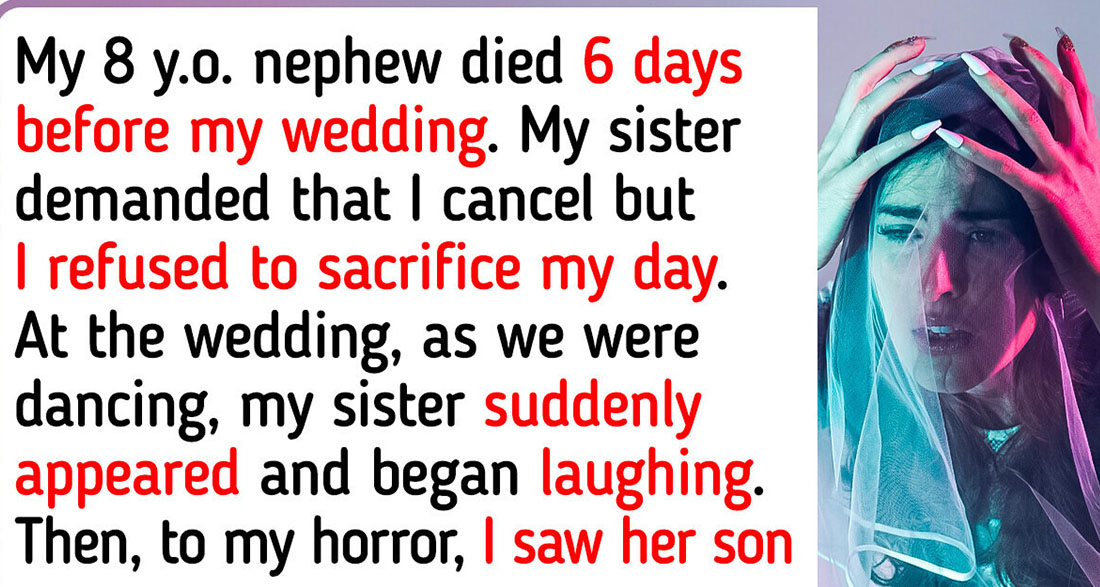Leah’s story is one of heartbreak, tough choices, and unexpected consequences. Here’s what happened:
Leah was getting ready for what should have been the happiest day of her life—her wedding. But just six days before the big day, her world was shaken by a terrible tragedy. Her sister’s husband and 8-year-old son were killed in a tragic accident. The pain was unbearable, and her sister was drowning in grief.
Desperate and broken, her sister came to Leah with a plea. “Leah,” she said, her voice trembling, “I can’t do this right now. Please, cancel the wedding. I can’t bear to be around any celebration after what happened.”
Leah was torn. She loved her sister deeply, but she was also thinking about the months of planning and the money that had been spent. Everything was already set for the wedding. In her mind, she couldn’t just throw all that away.
“I’m really sorry,” Leah told her sister, trying to keep her own emotions in check. “But I can’t cancel the wedding. Everything has been paid for.”
Her sister fell silent, the hurt clear in her eyes, but she didn’t argue anymore. The days that followed were tense, with Leah trying to focus on her upcoming wedding while also feeling the weight of her sister’s grief.
Finally, the wedding day arrived. Leah tried to push aside her worries and enjoy the celebration. The guests were dancing, the music was playing, and it seemed like everything was going according to plan. But then, something strange happened.
Out of the corner of her eye, Leah saw her sister in the crowd, laughing loudly. It wasn’t a joyful laugh—it was eerie, almost unsettling. Before Leah could even process what was happening, there was a sudden loud crash. All the lights in the venue went out, and the music stopped dead. The room plunged into darkness and confusion.
Then, the large screen in the venue lit up. Leah’s heart dropped as she saw what was being displayed. Instead of her wedding photos, the screen showed images of her sister’s husband and son—the very ones who had died just days before.
Leah’s breath caught in her throat as she realized that her sister had planned this. Her special day was being turned into a haunting reminder of the tragedy that had struck their family. Then, her sister took the microphone, her voice shaking with emotion and anger.
“How can you stand there and dance, celebrating, while your little nephew died less than a week ago?” she cried out, her words cutting through the room like a knife. “Shame on you!”
The entire room fell into a stunned silence. No one moved, no one spoke. Leah could barely breathe. But her sister wasn’t finished. With one final, scathing remark, she said, “When you have kids of your own, I’ll treat them with the same cold indifference you showed mine!”
And with that, she left the stage. The festive mood was destroyed, and one by one, the guests started to leave, unable to continue celebrating after what had just happened. Leah’s wedding day was ruined, left in tatters by her sister’s grief and anger.
Later, Leah found herself questioning everything. “Was I wrong?” she wondered, guilt and regret gnawing at her.
Dear Leah,
Thank you for sharing such a deeply emotional story. We understand how incredibly hard this situation must be for you, and we’d like to offer some thoughts that might help you navigate this difficult time:
Offer a Sincere Apology and Acknowledge the Pain:
Consider reaching out to your sister with a heartfelt apology. Let her know that you truly regret not postponing the wedding and that you now understand the deep pain your decision caused her. Express your sympathy and assure her that you are there for her during this time of loss.
Plan a Memorial Gathering:
A meaningful way to show your sister that you care about her loss might be to organize a small memorial gathering for her husband and son. This event could be a time for family and close friends to come together, remember them, and support one another in their grief.
Consider Family Mediation:
To work through the intense emotions and conflict, you might suggest family mediation. A professional mediator could help both of you express your feelings and concerns in a safe and structured environment. This could be an important step toward healing and understanding.
Offer Ongoing Support:
Finally, show your sister that your support for her is ongoing. Be there for her in the days, weeks, and months to come. Whether it’s through regular visits, helping with everyday tasks, or simply being there to listen, your continued presence in her life can help rebuild the trust and bond between you two.
Leah, your story reminds us how difficult it can be to navigate our own happiness in the face of others’ grief. But with empathy, understanding, and a genuine effort to make amends, you can begin the process of healing the rift with your sister and finding peace together.

